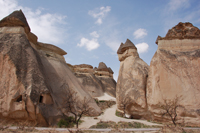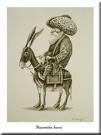Fairy Tales and Legends
from Cappadocia

The Residence of
the Gods - Argeus
The Legend of Mahsen
Donation from the Vizier
The Clairvoyant
Jinns and Fairies
The Muhtar of Uçhisar
An Extraordinary Discovery
The Test of Strength
A Musical Contest
Hacı Bektas
The Wise Dervish
Memories of the Village Elders
Stories of their life

Fairy Tales from Turkey
Nasreddin Hoca - Anekdotes

A Winter Snow
When I was a little boy, maybe six or seven years old, we experienced the coldest of winters, not at all comparable with those of today. Nowadays it hardly snows, but that winter it would not stop. Heavy winds drove the snow around the houses, and we could not go out.
As soon as it became quiet again, we immediately tried to open the door, but it was stuck. The white mass of snow kept it closed and only by pushing hard, were we able to escape through a gap, into the street.
What a surprise! The streets were entirely covered and the houses could hardly be recognised. We children enjoyed this natural spectacle enormously. We threw ourselves down in the fluffy snow and slid down the hills on our backs.
What meant lots of fun for us was not so for my father. With the other neighbours, he had to dig a tunnel into the meter- high snow, so it would be possible to leave the house and get to the village. Some of the tunnels they dug were as long as 15 meters.
My only problem at that time was that the wooden shoes I wore then were too slippery for ice and snow. I could hardly walk without falling on my bottom. I decided, “No, these just get in my way. I’ll simply take them off!”'
Yes, it was cold, but without shoes I was able to run behind the others again, unfortunately only for a short game though. Soon my feet were nearly frozen to ice and I quickly headed home again.
Back in the house, the cosiest place for us was around the tandır, the open fireplace in the ground of the kitchen. A low table, just high enough to put my feet underneath, stood right over the hot stone covering the flames. Floor cushions or minder were laid around it to sit on.
As soon as everybody got home, they took off their shoes and sat down. A tatlık, a big kilim-like tablecloth covered the table as well as our knees while we sat around. With bare feet on the warm stone and the tatlık over our knees, the icy cold soon left our bodies, and we enjoyed our meal.
Later on, by the light of the paraffin lamp, we listened to grandfather's tales of the past until my eyes became tired and heavy and I fell asleep. (The narrator was born in 1923)
The Teacher
I remember, as if it was only yesterday, how much I loved playing with the other boys from my Mahalle.
Every day we were outside in the street, or down in the valley. Wind and weather did not bother us too much and we climbed in and out of the caves, hiding behind the houses and in the neighbouring yards.
Sometimes we collected small round stones to play marbles with or a ball made of old pieces of cloth carefully bound together into a round mass. My favourite game however, was to flick kneecaps or thin bones of animals. Ground to make a small round disc, it was then polished and painted in beautiful colours, each individual to be able to identify them.
No matter how engrossed we were, the games came quickly to an end whenever the teacher was passing by, and we would all run towards him. We knew that he would reach into his pocket, to take out a handful of leblebi (roasted chickpeas) and divide them amongst us.
This is what I remember best, because I was very proud. The teacher who was so loved by all the children was my father.
But, he died at the age of 25 when I was just four years old.
My mother did well to keep my father’s rules alive by following them. Being educated to be a teacher, he always wanted the best education for his children as well, and I never got tired of constantly going over what we had been taught during school hours.
This drive to learn did me a lot of good, as after the five years of my education, I left school having passed the exams of the seventh grade.
I know my father would have been very proud. (The narrator was born in 1928)
The Outlaw
When I was a little boy, my sisters, brothers and I did not see my father much. My mother told us that when we were little he was always at home except when he was working in the field or the garden, of course.
Later he would travel from village to village, repairing the primitive wooden sledges used by the farmers for threshing grain. Called a düven, it had flintstone teeth imbedded in the underside, and when used a lot, the flintstones sometimes fell off. My father then formed new stones, sharpened them and carefully fixed them into the prepared holes in the wood. He would leave the house in the early morning, but he was usually back again in the evening again.
Then, suddenly one day, he was not there any more at all. We missed him a lot, but we did not want to ask our mother where he was.
Sometimes in the night, we saw him sneaking into the house. My mother would give him a good meal and my father would change his clothes. His trousers and shirts were always very dirty and we wondered why.
When we were old enough to understand the village gossip, we also realised our father's fate.
He had been declared an outlaw for some reason we did not learn. From that day on he lived in the mountains and only once in a while came back to Uçhisar to see his family.
(The narrator was born in 1923)
A Room of Our Own
I was not born in Uçhisar myself and I was too small to remember how we came here, but what I do remember are the sad eyes of my mother when she was telling us about our father.
My father died young, when my mother was pregnant with my little brother. As was the tradition, my grandfather of course took over my father’s responsibilities and asked my mother to live in his home in Uçhisar.
Suddenly there were two more persons in the small house and when my brother was born it seemed even tinier. Although there were a couple of caves for the family to live in, there was only one room available.
One day, we were told to get ready for a long trip and while my mother prepared some food for the journey, she told me to saddle the donkey, not forgetting the two big baskets.
From that day on, and for many more, my brother and I followed my mother to the nearby mountains where we cut stones out of the rock, travelling back every evening to Uçhisar. It was gruelling work, and making the trips then participating in the subsequent building were a tremendous strain.
It was all worth it, however, since the result of all that effort was that we could sleep in our own room. (The narrator's mother was born in 1909)
